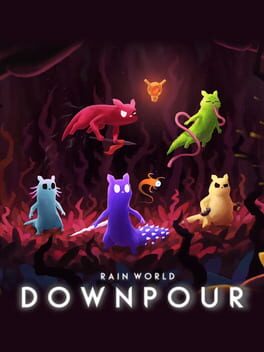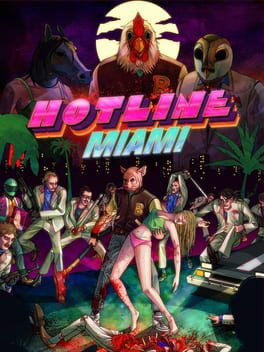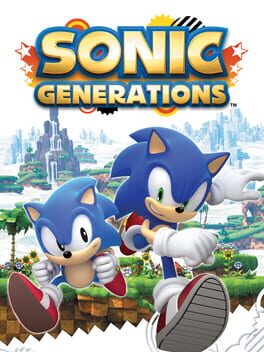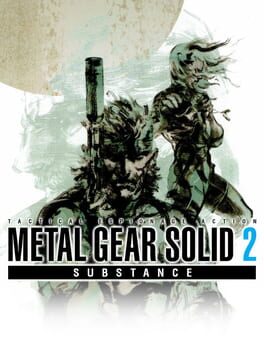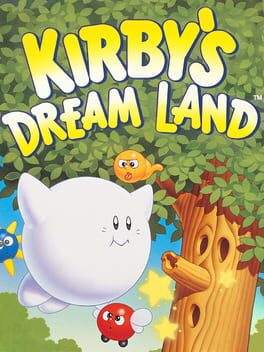NothingReally
8 reviews liked by NothingReally
Rain World: Downpour
2023
This review contains spoilers
Downpour's biggest strength is its ability to recontextualize the environment of the world, showing how few changes to the movement system can present a completely new set of fun platforming challenges. The movement in the original game is superb as it was, but I would definitely argue that several of the campaigns here do it even better. The speedrun feel of Rivulet, the ability to move a lot more freely during combat as Artificer, the Gourmand slide, the Spider-saint (that momentum preservation is so sweet) and the Spear-climbing possilibites of Spearmaster (my greatest idea was throwing a spear underneath with a backflip and then one above as well to reach certain ceilings with dropwigs).
The lore elements are consistent, if one were to engage with the lore of the original game that is. I fully understand, however, that the pearl-reading process was a powerfully tedious task, and I wished there was a simpler way to find out the lore. There's the wikis of course, but that's always less exciting than finding stuff out for yourself. Well, now with the added dev-tools, you can experiment at your leisure! So I hope people go back to the main game and check out the lore to see that the Iterators always were emotionally unstable discord users, and slugcats always were purposed beings, even though they are also animals. The player may be able to realize these things better if they complete all three of the OG campaigns, but the pearls go into further detail.
I do understand if the sheer feeling of encountering certain things, and the mystery surrounding each creature or plant is lost when there is a dictionary that can explain everything to you, but it was always there, there were always some answers waiting for those who were interested in the "canon" explanations. If you aren't, Downpour's focus on story will lose you fast. I, however, think that all of them present fascinating ideas to an already fascinating world, one of my favorites, now only cemented as one of the coolest fictional universes of all time.
I think Spearmaster's campaign could be skipped, I believe the devs even pondered removing it, but I did enjoy the fact that playing it allowed me to defeat creatures I never could otherwise. It did have the single worst idea of removing one of this slugcat's key abilities as part of the progression, which I thought sucked. It is my least favorite one, it feels the most out of place. And while I do greatly enjoy this story, all the ideas and moments that reward the curious are there, nothing really comes close to the feeling of the original Survivor playthrough. I replayed parts of it before diving in, and the void sea segment sends shivers down my spine every time, same as meeting Pebbles. There are cool setpieces, but the feeling is different. Perhaps it's because I've gotten so much better through these campaigns that I gained excitement for new challenges and lost some of that fear of the unknown.
But there is no way to ever make another campaign like the first one. Even replaying Survivor I was already much better and knew so much more about how to deal with threats. I have moved from observing the ecosystem and slipping past to engaging with the ecosystem, being a part of it. And in that way I think Downpour's approach is the correct one for a sequel aimed at players familiar with the systems, while also adding some more tutorial messages for the starter Slugcats while sleeping. To me it opens up Rain World to so many more new possibilities, and I'm so happy it truly rewards anyone who wants to engage with the movement system or combat or lore on a deeper level. Though I fully understand if there are people who do not wish for Rain World to be like that.
I've seen the sentiment blaming modders for such an approach, but that's not true. The devs specifically overviewed everything and worked with them on the lore. It was something they wanted to add to the game, something they worked on as well even if a lot of the work was done by the modders. To conclude that this DLC is something detached from their vision of the base game is weird. I've personally never felt that it is. And that's actually the best praise I can give it.
The lore elements are consistent, if one were to engage with the lore of the original game that is. I fully understand, however, that the pearl-reading process was a powerfully tedious task, and I wished there was a simpler way to find out the lore. There's the wikis of course, but that's always less exciting than finding stuff out for yourself. Well, now with the added dev-tools, you can experiment at your leisure! So I hope people go back to the main game and check out the lore to see that the Iterators always were emotionally unstable discord users, and slugcats always were purposed beings, even though they are also animals. The player may be able to realize these things better if they complete all three of the OG campaigns, but the pearls go into further detail.
I do understand if the sheer feeling of encountering certain things, and the mystery surrounding each creature or plant is lost when there is a dictionary that can explain everything to you, but it was always there, there were always some answers waiting for those who were interested in the "canon" explanations. If you aren't, Downpour's focus on story will lose you fast. I, however, think that all of them present fascinating ideas to an already fascinating world, one of my favorites, now only cemented as one of the coolest fictional universes of all time.
I think Spearmaster's campaign could be skipped, I believe the devs even pondered removing it, but I did enjoy the fact that playing it allowed me to defeat creatures I never could otherwise. It did have the single worst idea of removing one of this slugcat's key abilities as part of the progression, which I thought sucked. It is my least favorite one, it feels the most out of place. And while I do greatly enjoy this story, all the ideas and moments that reward the curious are there, nothing really comes close to the feeling of the original Survivor playthrough. I replayed parts of it before diving in, and the void sea segment sends shivers down my spine every time, same as meeting Pebbles. There are cool setpieces, but the feeling is different. Perhaps it's because I've gotten so much better through these campaigns that I gained excitement for new challenges and lost some of that fear of the unknown.
But there is no way to ever make another campaign like the first one. Even replaying Survivor I was already much better and knew so much more about how to deal with threats. I have moved from observing the ecosystem and slipping past to engaging with the ecosystem, being a part of it. And in that way I think Downpour's approach is the correct one for a sequel aimed at players familiar with the systems, while also adding some more tutorial messages for the starter Slugcats while sleeping. To me it opens up Rain World to so many more new possibilities, and I'm so happy it truly rewards anyone who wants to engage with the movement system or combat or lore on a deeper level. Though I fully understand if there are people who do not wish for Rain World to be like that.
I've seen the sentiment blaming modders for such an approach, but that's not true. The devs specifically overviewed everything and worked with them on the lore. It was something they wanted to add to the game, something they worked on as well even if a lot of the work was done by the modders. To conclude that this DLC is something detached from their vision of the base game is weird. I've personally never felt that it is. And that's actually the best praise I can give it.
Hotline Miami
2012
EarthBound
1994
Infinitely charming and heartwarming entry in a genre which is often repetitive. Every aspect of Earthbound is emotive, from the most minor lines of dialogue, to the music, to the visual aesthetic and the story. Itoi's blend of artistic cohesion and sincerity was present in Mother (NES) but is taken to the next level here. One could argue the core combat mechanics do not sufficiently rise above the mindless fun of the genre, but the novel additions (like rotating health bars), sense of character (Ness can get homesick!), and creative, memorable sprite work make sure that even turn based battles don't break Earthbound's atmosphere. What could one call something so airtight yet so touching other than a masterpiece?
Sonic Generations
2011
There's more to a video game than being pleasant. The Genesis Sonic games had distinct imagery, complex level design and likable spirit, serving to do more than placate. The Dreamcast Sonic Adventure games fail to consistently engage most adults, and some of the engagement that is there is frustration, but at least they surprised you. With Sonic Generations, Sonic Team got so neutered by decades of fan complaints against their risk taking mentality that they retreated into their shell, making a perfectly serviceable game but one that touches nobody, and changes nothing. They probably haven't made a game as good since, somehow.
Kojima truly breaks the mold with Metal Gear Solid 2: Sons of Liberty, by making a video game masterpiece that turns being less fun than it could be into a strength instead of a weakness. I'm not sure Kojima ever again reached the level of precision he achieves here. Every seemingly innocuous detail is a laughably inspired piece of postmodern authorship that ties back into the whole of the narrative. A narrative which seems totally normal until it all of the sudden doesn't, at which point it begins discussing ongoing international conspiracies (real ones) with shocking candor and density, all the while keeping the player hooked with back to back exciting plot twists and gameplay ideas. That Kojima pulls this off while also creating a satisfying sequel to an already great game, and an emotionally powerful game in its own right, well... its all very impressive. Lack of fun boss fights and the general brevity of the gameplay put this at the bottom of the numbered MGS games for me, but its about as high a floor as I've ever seen, and I'm from New York City.
Critics of Ocarina of Time's gameplay mechanics have perhaps missed the forest for the trees with regards to art as experience. While the occasionally tedious combat system, overly simplistic puzzles and linear sense of progression meaningfully hamper the experience of playing Ocarina of Time, I do not believe them to be at all fatal, since it is the cinematic element of the game that makes it most interesting. Massive green fields which serve little purpose other than to be traversed sound like a waste of space, until one considers the immersive effect of including such a thing in an adventure game. Ocarina is a pioneer in regards to emotional engagement. The story is incredibly basic, but its beats hit with relatively intense power because the game is designed around them. Seemingly needless wait times serve to heighten the scope of the adventure in the player's heart. Dramatic use of angles, both in cutscenes and in gameplay, help create a sense of not just large scale adventure but serious emotional consequences. People remember Link's first meeting with Ganondorf and their first time stepping outside of the Temple of Time for a reason. It may not be complex, but the weight there is the beginning of something seriously special, and to deny that is seriously missing the point. The "gameplay" simply can no longer be separated from the experience of playing the game.
Kirby's Dream Land
1992
Metal Gear Solid
1998
An enthralling blend of cutscene and gameplay the likes of which had never before been seen on home consoles! The meta elements, ludonarrative fluidity and political commentary made the game a deservedly hot topic upon release, but the optimism and empathy at the game's core is why Metal Gear Solid has stuck around. The game has dark views of war and politics, but that pain is in service of truth and empathy. Every villain has a story, and every sin can be forgiven. This becomes even more powerful retroactively, knowing the incredibly dark path the Metal Gear series eventually takes, this entry becomes bittersweet in its innocence.
